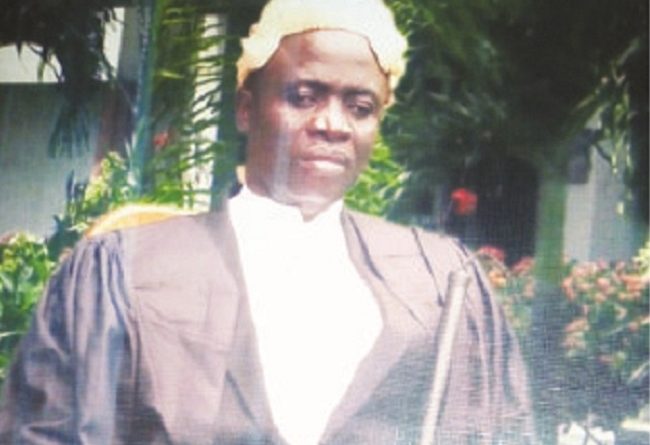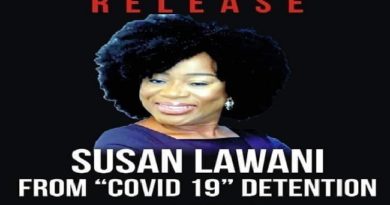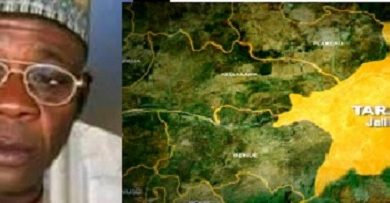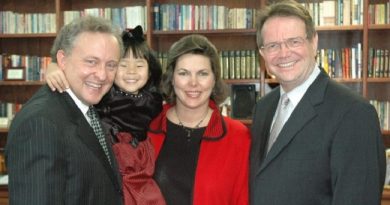Meet The Igbo Blind Lawyer Who Never Lost A Case In Court
Geoffrey Asadu is a study in courage. A legal practitioner with a difference. Regardless of his physical challenge of blindness, he gained admission into the University of Nigeria, Enugu Campus, and came out in flying colours.
One remarkable thing about this rare breed is that he has never lost any case in court for the over two decades that he has been in active legal practice. He spoke to our correspondent about his life.
His Early Life
I was born on February 25, 1962. I was not born blind. I was already six years old when, all of a sudden I became blind. Before then, I was already dealing in yam tubers at Ogige main market, Nsukka, to help my parents augment their source of income as they were not financially stable. The blindness came as a result of severe headache that started in 1976. The headache lasted for about three days. As the headache continued, I was taken to Akulue Hospital, Nsukka, where I was administered with one drug by one medical doctor, who owned the hospital. I was given an injection by the doctor for three days. On the third morning, I was supposed to go to hospital but I was surprised to discover that I couldn’t see. I became totally and automatically blind. I got up that morning but couldn’t see. I groped and started shouting that I wasn’t seeing again. I was rushed to Bishop Shanahan Hospital, Nsukka, UNTH, Enugu, and Parklane Enugu, but no way. We even went as far as Kano State but all to no avail. My sight couldn’t come back, till today. My father did everything he could to make me see again but it was no longer possible. When later I told the doctor that many people were of the opinion that the injection he administered on me might have caused my blindness, he became so much worried and uneasy.
World of blindness
As I discovered that I had become totally blind, I felt devastated. I almost lost hope in life. However, in 1979, I started primary school at School for the Blind, Oji River, in the then Anambra State. At first, I was reluctant to go there but later I had to go there. I did Braille reading and writing. In 1981, I passed the common entrance and was posted to Saint Theresa’s College, Nsukka where I did my West Africa Senior School Examination (WASSCE) in 1986 with flying colours. I have been using braille machine, typewriter and tape recorder all through my years and even now. In 1987, I did JAMB and got admission into the Faculty of Law, University of Nigeria, Enugu Campus (UNEC). In any case, I deferred the admission because of my employment with Anambra State Social Welfare. I started the study in 1988 and finished in 1992, had my law school in Lagos in 1993 and was finally called to bar.
Life as a lawyer and social/welfare worker
It has not been easy. It is not supposed to be as easy as a matter of fact. There have been a lot of challenges, but I don’t have any regrets. I have not lost any case in court since I started practicing for more than 25 years now. I am feeling so much fulfilled. I don’t think there is anything I could have achieved better or more if I was not blind. I am married with seven children, two of whom are now graduates. I have built two duplexes in my village here. I have a private car, so to speak. Politically, I am also active. I am a member of the Peoples Democratic Party (PDP). Currently, I am the president-general of the Enugu State Education and Social Development Workers Association. I rose from the level of welfare assistant to the director. So, it has been challenging but I don’t feel short-changed. I am fulfilled.
Challenges of physically challenged persons
Physically challenged persons go through a lot of things. However, let me advise them not to see their condition as an excuse to degrade themselves. It is not a certificate for them to start begging on the streets and other undignified activities. Let them look into themselves and see what they can do for themselves. They should start a small business or any craft, rather than begging. At the same time, I wish to appeal to the government at all levels to look into the problems and challenges of physically challenged persons. They should see them as people that need special attention in society. They should put them in their scheme of things like employment, empowerment, and appointment. They should not neglect them. At the same time, non-governmental organizations, individuals and even churches can lend a helping hand to physically challenged persons. So many of them are geniuses but because they don’t see anybody to give them a helping hand, they become useless in society. I always wonder what I would have been if I didn’t get a formal education. That’s what is happening to tens of thousands of physically challenged persons in our society.”




